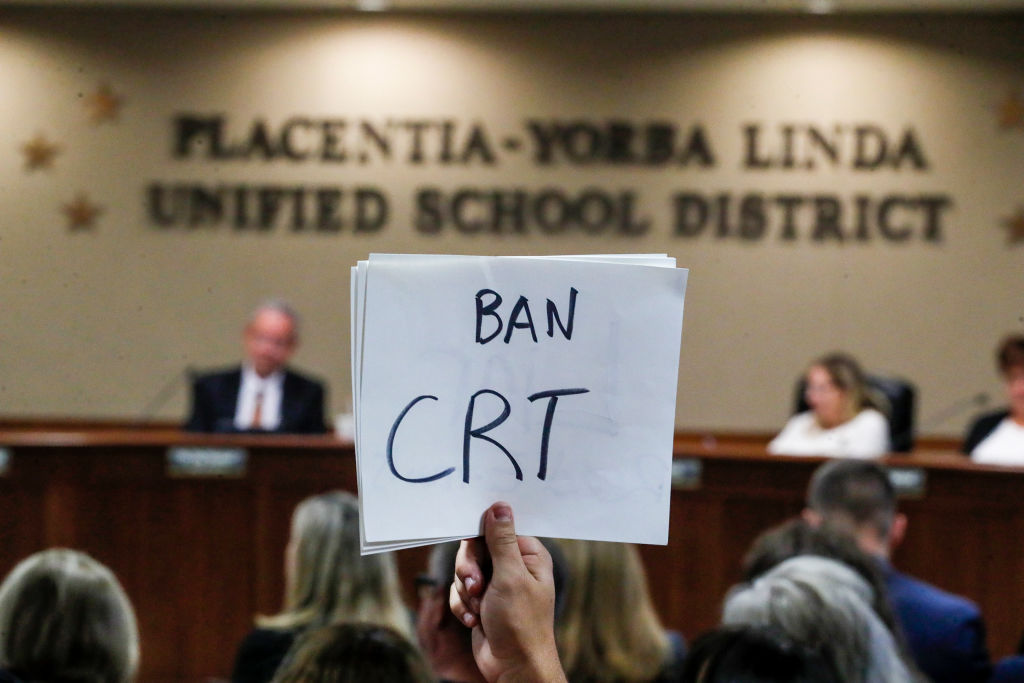The only “good amount” of race discrimination is none.
What is Discrimination?

Not all distinctions are unjust.
Sex and race are not the same. Racial differences are benign, really being no more than skin deep. Therefore, they should have no relevance to how society governs itself. From this we conclude, along with Justice Harlan, that the law should be colorblind and not tolerate racial classification of citizens. This theory underlies the recent Supreme Court ruling in Students for Fair Admission v. President and Fellows of Harvard College that universities may not use race to determine admission.
A similar approach does not hold for sex because the differences between men and women are not irrelevant, or even insignificant. To note one obvious dimorphic characteristic that every human society in history has recognized, men on average are significantly stronger than women. If we have some certainty as to what is a woman, we can readily acknowledge that women can bear children while men cannot. Concomitantly, women menstruate and lactate while men do not. Men are higher in testosterone while women are higher in estrogen. Men are stronger, more aggressive, and more detached from childbirth. While these differences are often, like race, benign, there are times when we have to recognize them. Sports and intimate areas such as bathrooms and prisons are obvious examples. While we have long recognized the gross injustice of racial segregation in sports and restrooms, and thus legislated against them, we have upheld such distinctions between men and women.
The problem stems, I think, from our mistaken notion of what “discrimination” means. My students, almost to a person, believe discrimination is always and everywhere wrong. I appreciate why they think this way. They have a profound belief in equality and therefore blanche at anything that suggests different treatment. Because they know that discrimination can be invidious, they condemn discrimination in a blanket manner. This, however, is a sign of lazy, if well-intentioned, reasoning.
While we reflexively recoil from the notion of discrimination regarding human beings, we use the word quite positively in other circumstances. For example, someone with a particularly good ear for music is said to have “discriminating taste.” Properly trained and having listened to much good, complex music, the person of discriminating musical taste might easily differentiate between early and late Bach, notice subtle distinctions in particular interpretations of a Chopin piece, or (let’s be less snooty) point out interesting and evocative key changes in a Beatles tune.
We say something similar regarding people who are food and drink connoisseurs. We say such people have a “discriminating palate.” For example, in an episode of the old MythBusters television show, the MythBuster gang tests the myth that you can take bottom-shelf vodka and by running it through a carbon filter (such as a Brita filter) turn it into a top-shelf vodka. They get some low-quality vodka, create various batches based on how many times they filter it, and then get some actual high-quality vodka. They bring in the head of the San Francisco World Spirits Competition. He taste-tests eight different vodkas of various quality and filtration. Outcome? He nailed it. Eight for eight. Not fooled at all. This is as opposed to cast member Kari Byron who couldn’t really tell rotgut vodka from the finest vodka. The expert was a man of discriminating vodka taste.
Discrimination simply means “to make distinctions.” What the music or vodka authority can do that most of us cannot is detect fine distinctions in music or drink.
All of us make hundreds of distinctions a day. We are discriminating all the time. Why do I use this toothpaste versus that toothpaste? Why do I watch this show, not that? Why do I accept that invitation, but not this? I am discriminating every time I evaluate (e.g., baseball is better than soccer, Merle Haggard better than Taylor Swift, ribeye steak is better than canned tuna).
We are told not to discriminate in employment, but we do it all the time. When we in higher education hire a new faculty member, we usually say the applicant must have a degree in a particular discipline. If we are hiring a biologist and a political scientist applies, we throw away the political scientist’s application. We are discriminating against those who do not have a doctorate in biology. I was once on a hiring committee to get my university a new head football coach. A guy applied who worked at a funeral home but really liked watching college football. Needless to say, we discriminated against him. We were looking for someone who had at least coached one football game. Ever.
The law allows discrimination on a regular basis. The Americans with Disabilities Act (ADA) says we cannot discriminate based on disability, but we don’t let blind people become airline pilots, and people with a history of seizures are sometimes denied a license to drive a car. Though the Supreme Court made a goofy ruling to the contrary a couple decades ago regarding professional golf, sports discriminates all the time against those who are not physically up to the athletic challenge. No one claims this is unfair.
We know we aren’t supposed to discriminate based on age, especially in employment, but, again, the law does this all the time. We treat juvenile offenders differently than adults. Why don’t we allow those under eighteen to vote? Isn’t that discrimination? Yes! But it is reasonable discrimination, i.e., a reasonable distinction. The young have neither the formal nor life education to make sound voting judgments. Also, the young are usually dependent on parents, thus their vote isn’t necessarily free. Because children typically have no money, no job, no property, and few community responsibilities, they aren’t really invested in society in a manner that demands they take part in governing. For all these reasons, we forbid the young from voting.
Discrimination can also provide benefits as well and place restrictions. Again, consider age. In the United States if you make it to sixty-five years old without dying, we give you state-subsidized health insurance, i.e., Medicare. We will also give you a federal pension, Social Security. So, people can get copious federal benefits based on nothing other than being old.
Making distinctions is not inherently a bad thing. The questions we face when the law makes distinctions, as it inevitably must, is whether the distinctions, the discrimination, are just or not. That’s why we hold legal distinctions based on race to be illegitimate. In all my examples of “good” discrimination above, we recognize that there are legitimate reasons for making the listed distinctions. Academic quality demands we hire people with proper training. The immaturity of youth frees the young of some responsibilities (jail time, permanent record) while denying them others (voting). The elderly find it hard to work and have many health issues. Having paid their dues, we give them public benefits.
This is true of men and women. Again, physical strength is the obvious example. While laws such as sexual assault and rape are nominally non-sexed, we all know that they predominantly exist to protect women from men. This is true in prisons as well. We segregate prisoners based on sex to protect women from society’s most violent men. Because men can physically dominate women relatively easily, we set up laws specifically to defend female vulnerability.
The differences in our bodies and the sexual nature of those differences necessitates separate intimate quarters. When a woman buzzes the metal detector at the airport, a female TSA agent is asked to do the pat down, not a man. We once kept men and women largely separate in the military, recognizing that the natural attraction between men and women might create complications in unit cohesiveness. We have done away with many of these restrictions, but it is noteworthy that to this day only young men are asked to sign up with Selective Service. We still in our heart of hearts recognize that war is largely a man’s job.
This might hold for education as well. At young ages, differences in how boys and girls develop and mature might make single-sex education a credible alternative. While their numbers are dwindling, the presence of single-sex high schools and colleges (or even single-sex dormitories at college) attests to the fact that maybe the heightened sex drive of high school and college students interferes with the learning process. It is reasonable, then, that some choose to educate the sexes separately.
Race, on the other hand, is virtually never relevant to any of these matters. Does the mere color of my skin alter my ability to make voting choices, do a job, defend my country, read a book? Nobody really believes that the law shouldn’t discriminate, but when it does, we need to provide reasons. We base our evaluative criteria on the basis of discrimination (e.g., race versus sex) and what is at stake (e.g., a job, an education, privacy). Race seems separate from age, physical ability, and sex, and so the law cannot recognize racial distinctions. Any kind of discrimination can be abused, going from reasonable, relevant discrimination to something harsh and unjust. Nowhere is this more true than race. Again, this is particularly true of race because our skin color says so little about our abilities. American history teaches us the peril of the law drawing racial distinctions. Precisely because of the benign nature of race, any legal distinction based on race inevitably breeds deep resentment.
Gender-theory radicals sow injustice as they try to convince us to ignore differences between the sexes. This is most comical yet also most infuriating in sports. The very existence of separate men’s and women’s sports leagues (the PGA and LPGA, the NBA and WNBA, separate high school and college sports, etc.) stems from the recognition of highly relevant differences between men and women. Here we must discriminate, make distinctions, regarding sex in order to preserve justice.
Politics is a messy business. One wishes there was a convenient check list that would determine for us when distinctions are just and when they are unfair. Aristotle teaches us to treat likes as like and unalike as unalike. If only those categories were always readily apparent! My argument is that differences in race, i.e., skin color, are never enough to say we are legally “unalike.” For other distinctions we must cultivate wisdom, prudence, and goodwill. We must cultivate citizens with discriminating taste, true connoisseurs of justice.
The American Mind presents a range of perspectives. Views are writers’ own and do not necessarily represent those of The Claremont Institute.
The American Mind is a publication of the Claremont Institute, a non-profit 501(c)(3) organization, dedicated to restoring the principles of the American Founding to their rightful, preeminent authority in our national life. Interested in supporting our work? Gifts to the Claremont Institute are tax-deductible.
Conservative jurisprudence grapples with a new view of Originalism.
The liberal order rests on conservative, not rationalist, foundations.
Training policy personnel is crucial in mounting a counter-offensive.
Taxing universities is key to solving our student debt mess.





